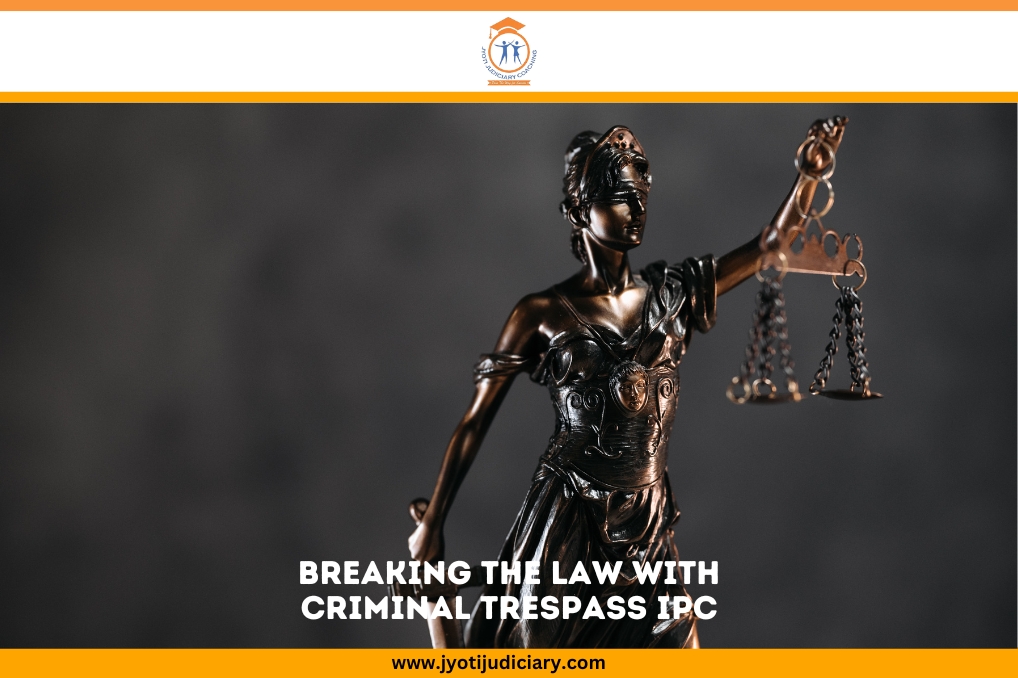
In accordance with the Indian Penal Code (IPC), criminal trespassing is an extremely serious crime with significant potential legal consequences also known as illegal trespass. When someone illegally enters or stays on the property of someone else without permission, it is referred to as trespassing. The property owner’s rights have been infringed by this act, which is punished by law in criminal as well as civil courts.
Criminal Trespass IPC
Criminal trespass is defined as follows in Section 441 IPC:
- As per the criminal trespass meaning, anyone who enters property owned by another with the intent to commit an offense, or to intimidate, insult, or annoy any person in possession of such property, or who has lawfully entered such property but remains there with the intent to commit an offense, or with the intent to intimidate or insult any such person, is said to have committed criminal trespass.
- Therefore, it can be inferred that criminal trespassing law is divided into two categories:
- the first is the act of someone entering another person’s private property without authorization, either express or implied, and
- The second is the act of someone entering a property legally but not intending to commit a crime, thus making the act illegal.
Common Law Trespass
- When someone enters or stays on your property without authorization or authorization under the law, it is known as trespassing.
- Trespassing is defined by law as purposefully entering or remaining on your private property without permission.
- This includes going over property lines, breaking into structures, or even just entering your property without permission.
Criminal Trespass IPC: Essential Elements
In order to prove a criminal trespass offense, the following factors must be present:
- Illegally entering or staying on another person’s real property;
- Continuing to enter such land illegally even if admission is permitted;
- Such access or unauthorized stay must be done with purpose.
- Engage in criminal activity;
- Frighten, make fun of, or annoy the property owner.
Criminal Trespass IPC Punishment
The criminal trespassing charge is:
- criminal trespass ipc 447 discusses the punishment for criminal trespass.
- It states that any person found guilty of criminal trespassing faces a maximum sentence of three months in jail, a maximum fine of five hundred rupees as a criminal trespass penalty, or both.
Criminal Trespass: Important Rulings
- In the case of Satrughana Nag v State of Odisha, the appellant entered the respondent’s home late at night, but her brothers came and saved her when they heard noises coming from the room. The district court judge took notice of the complaint, which claimed a Section 457 infringement.
Section 448 of the IPC penalizes house trespassing, which the court found to be the case in this instance.
- In the case of Biswajit Paul v State of Assam, a group of people armed with sticks, spades, and other implements came to drive the petitioner off his land. In order to prove trespass, the court rules that it must be demonstrated that someone gained unauthorized access to another person’s property and that this unauthorized entry was carried out with the intention of committing a crime or intimidating, harassing, or upsetting the property owner. But ownership was nowhere to be found, and a scheduled meeting to find out who owned what failed.
Because there is insufficient evidence to support the establishment of the trespassing criteria listed above, the appeal was rejected.
Any court may seek redress if a stranger, or, for that matter, even a known person, enters any property you own with the intent to cause harm or injury. This would be considered criminal trespass under the Indian Penal Code. The act of intending to commit a crime is a prerequisite for the definition of criminal trespass; information alone does not qualify as such. Furthermore, the severity of the aggravation that existed at the time the offense was committed would determine the punishment prescribed for the offence of criminal trespass.
In a nutshell, trespassing into someone’s home is a more serious offense than simple criminal trespassing; additionally, breaking into someone’s home and loitering there at night are more severe types of trespassing; finally, both of these offenses carry the harshest penalties.
Criminal Trespass IPC FAQs
1. What are the essentials of criminal trespassing?
- Access to or possession of another’s property;
- If this entry is authorized, then staying on such land without permission;
- The purpose of the illegal entry or stay must be to either commit a crime or
- To threaten, offend, or disturb the person who has the property.
2. What is the conclusion of criminal trespassing?
It is clear that entering someone else’s private property without that person’s consent or permission, either explicitly or implicitly, and staying there to commit a crime constitutes criminal trespass.
3. What are the provisions regarding criminal trespassing?
Any person found guilty of criminal trespassing faces a maximum sentence of three months in either type of jail, a maximum fine of five hundred rupees, or both sentences.
4. What is intent in criminal trespassing?
“Criminal trespass” is entering or remaining on another person’s property with the intent to commit an offense, intimidate, insult, or annoy that person, or, having lawfully entered or remained on that property, remaining there illegally with the intent to commit an offense, intimidate, insult, or annoy that person.
5. Is criminal trespass bailable?
Any magistrate may convict someone for this offense, which is cognizable, non-bailable, and punishable by up to two years in prison, a fine, or both.
6. What is the difference between criminal and civil trespassing?
Criminal trespass includes trespass committed with the intent to commit an offense against the possessor of the property or to cause him any kind of annoyance. In contrast, civil trespass refers to situations where a person directly enters another person’s land without that person’s permission, remains on the land, or places any object upon the land.
7. Can trespassers be shot in India?
If a trespasser doesn’t pose a realistic fear of death or serious injury, one cannot use force against them. As stated in Section 103 of the IPC, the right to private property defense includes the ability to cause death in the event of robbery.
8. Can police commit trespass?
The answer would be “no” unless they had a very good cause to be there and the land was properly marked with trespassing signs.
9. What is the meaning of house trespass?
“House-trespass” refers to the act of breaking the law by going into or staying within a building, tent, or vessel that is used as a place of residence for people, a place of worship, or a location where property is kept.
10. What is criminal trespassing in the brief note?
The purpose of making criminal trespassing illegal is to safeguard individuals’ freedom to enjoy their private property in peace. Section 447 of the Indian Penal Code stipulates that trespassing is punishable by up to three months in prison, a fine of up to 500 rupees, or both.
11. What are the ingredients of criminal trespassing under IPC?
The following are the elements of the crime of criminal trespass under section 441 of the IPC: entering into or upon another’s property with the aim to commit an offense, intimidating, injuring, or upsetting any person in possession, and so forth.
12. Is trespassing criminal or civil in India?
Everybody has the right to use their property as they like without interference, and any behavior that violates this right is considered trespass. Usually, it’s seen as a civil wrong. The Indian Penal Code of 1860 defines criminal trespass as trespassing with the intention of committing a crime.
13. Which coaching is best for the judiciary?
The most effective judiciary coaching in Jaipur is provided by Jyoti Judiciary Coaching. The objective is to create a comfortable learning environment for the students. It makes the difficult task seem easy, which increases the likelihood of achieving the desired outcome. The objective at Jyoti Judiciary is to give students the best possible education possible. The Institute pledges to use every resource at its disposal to provide you with the finest preparation for the Judicial Services entrance examinations.
14. Which coaching is best for RJS preparation?
“Jyoti Judiciary Coaching” is a reputable coaching program in Jaipur that helps prepare students for the RJS exam. The finest online and offline RJS coaching program in Jaipur, Jyoti Judiciary, enables a methodical approach to preparing for the RJS examination. Their curriculum has been carefully designed to cover all the subjects and courses necessary for passing the Rajasthan Judicial Services Exams.
Read to know: Criminal Intimidation under IPC
With the goal of giving students the best coaching available for law entrance exams including the CLAT, AILET, and various other state judiciary exams, Jyoti Judiciary Coaching, India’s Finest educational Platform, was established. Come enroll now with Jyoti Judiciary!
For any latest news, legal topics, judiciary exams notifications, patterns, etc watch Jyoti Judiciary’s YouTube channel for legal videos for any updates at https://youtube.com/@jyotijudiciarycoaching4852?si=2cwubh9d2A9urwJf










